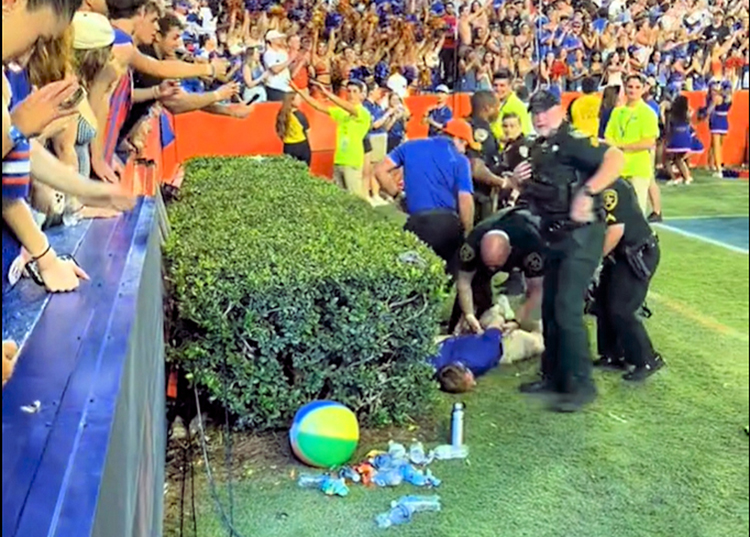World
Fans Face Felony Charges for Rushing UF Football Field after Victory

Four football fans are facing felony trespass charges after celebrating the University of Florida’s unexpected victory against Texas on October 4, 2023. This marks the first application of a controversial law signed by Republican Governor Ron DeSantis in May 2023, which was initially aimed at penalizing protesters of former President Donald Trump. Lawmakers in Florida have since expressed surprise at the law’s use against enthusiastic sports fans.
The fans were arrested following the Gators’ 29-21 win over the then-No. 9 Longhorns. The event sparked a wave of excitement among students and alumni, but it also led to arrests by local police. Among those arrested were two University of Florida (UF) students—Landon Beckham Kingsle Kefford, 21, from Parkland, and Danek Everett Blalock Cirafesi, 19, from Somerville, New Jersey—along with two older individuals, Kevin Wilcox Joy, 35, from Mount Pleasant, South Carolina, and John Paul Schmidt, 27, from Greensboro, North Carolina.
New Law’s Unintended Consequences
The law, which took effect on May 16, 2023, prohibits unauthorized entry into areas secured by law enforcement or ticketed events, imposing penalties of up to five years in prison and fines as high as $5,000. Previously, such incidents were treated as misdemeanors. The law has drawn criticism for its potential to criminalize activities that have long been part of college football culture.
During the legislative process, Senator Jonathan Martin, the bill’s sponsor, clarified that the law was designed primarily to protect the President during visits to Florida. In a Senate Criminal Justice Committee hearing, Martin stated, “This is specifically intended to address the Secret Service efforts to keep our president safe while he’s in the State of Florida.” Despite this intention, the bill passed unanimously in the House, with only two Democratic lawmakers voting against it.
The distinctiveness of this case highlights a growing concern among legislators about crowd control at sporting events, particularly after chaotic incidents at other venues. For instance, a recent event during the Copa América soccer tournament led to significant crowd disruption, prompting lawmakers to seek tougher penalties for similar behaviors.
Cultural Context and Reactions
The arrests contrast sharply with the atmosphere at other universities where rushing the field after a significant win is commonplace and often celebrated. Notably, during a recent game in August, Florida State University fans rushed the field after defeating Alabama without facing any legal repercussions, although FSU was fined $50,000 by the Atlantic Coast Conference.
Former UF head coach Steve Spurrier, who led the team from 1990 to 2001, expressed nostalgia for the excitement such celebrations bring to college sports. In a recent interview, he remarked, “When I watch these other schools do it, that’s a memory of a lifetime for those students.” Spurrier had previously encouraged students to rush the field after a win against Louisiana State University, although they ultimately remained seated.
The four fans arrested on October 4 have been banned from attending games at the university for three years. Although they were booked and released without bail, their cases remain unresolved, with the State Attorney’s Office yet to formally charge them. Legal representatives for the fans believe the felony charges were recommended as a deterrent against future incidents, although they hope the cases will eventually be resolved without permanent criminal records.
Legal experts suggest that the prosecution may focus on educating the public rather than imposing harsh penalties on students who partake in what some consider a harmless tradition. Defense attorney Bennett Hutson commented, “If it’s a kid doing something dumb and he doesn’t hurt somebody … they’re not trying to change that kid’s future.”
This situation raises crucial questions about the balance between maintaining safety at public events and preserving the spirit of college traditions. As the legal implications of this new law unfold, it remains to be seen how it will influence fan behavior at sporting events across Florida.
-

 Lifestyle5 months ago
Lifestyle5 months agoLibraries Challenge Rising E-Book Costs Amid Growing Demand
-

 Sports4 months ago
Sports4 months agoTyreek Hill Responds to Tua Tagovailoa’s Comments on Team Dynamics
-

 Sports4 months ago
Sports4 months agoLiverpool Secures Agreement to Sign Young Striker Will Wright
-

 Lifestyle4 months ago
Lifestyle4 months agoSave Your Split Tomatoes: Expert Tips for Gardeners
-

 Lifestyle4 months ago
Lifestyle4 months agoPrincess Beatrice’s Daughter Athena Joins Siblings at London Parade
-

 Science4 months ago
Science4 months agoSan Francisco Hosts Unique Contest to Identify “Performative Males”
-

 World4 months ago
World4 months agoWinter Storms Lash New South Wales with Snow, Flood Risks
-

 Science5 months ago
Science5 months agoTrump Administration Moves to Repeal Key Climate Regulation
-

 Business5 months ago
Business5 months agoSoFi Technologies Shares Slip 2% Following Insider Stock Sale
-

 Science5 months ago
Science5 months agoNew Tool Reveals Link Between Horse Coat Condition and Parasites
-

 Sports5 months ago
Sports5 months agoElon Musk Sculpture Travels From Utah to Yosemite National Park
-

 Science5 months ago
Science5 months agoNew Study Confirms Humans Transported Stonehenge Bluestones









